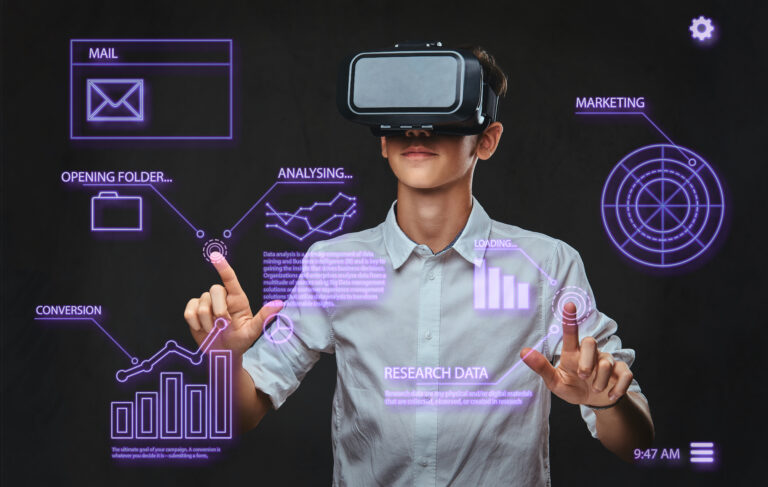Artificial Intelligence is transforming the work landscape in unprecedented ways. While some fear that jobs will be replaced, others see an era of limitless opportunity. Let’s explore the key impacts of AI on the future of work and how we can prepare for this new reality.
AI-Generated Opportunities
- Automation of Repetitive Tasks
AI excels at taking over monotonous, repetitive tasks. This frees up workers to focus on more creative and strategic tasks, increasing productivity and job satisfaction. For example, AI-powered chatbots can handle FAQs and customer support, allowing employees to focus on solving more complex problems. Additionally, industrial robots can perform repetitive tasks in manufacturing with precision and consistency, reducing human error and improving efficiency.
- Creation of New Professions
With the rise of AI, new professions are emerging that were previously unimaginable. From machine learning engineers to AI ethicists, the job market is expanding in new directions. Professions such as “AI trainers,” who teach algorithms how to learn and improve, and “AI explainability experts,” who ensure that AI decisions are transparent and understandable, are gaining traction. These new professions require skills that combine technical knowledge and critical thinking.
- Improving Decision Making
AI systems can analyze large volumes of data in real time, providing valuable insights that help companies make more informed and informed decisions. For example, in the financial sector, AI algorithms can predict market trends and identify investment opportunities. In the healthcare sector, AI can analyze patient data to recommend personalized treatments and predict disease outbreaks. AI’s ability to process and interpret complex data far surpasses that of humans, leading to more accurate and evidence-based decisions.
- Mass Customization
AI enables mass personalization, whether in marketing, customer service, or education. Companies can create unique, tailored experiences for each customer or user. For example, streaming platforms like Netflix and Spotify use AI algorithms to recommend content based on users’ interests and behaviors. In education, adaptive learning systems use AI to personalize learning materials based on each student’s pace and learning style. This mass personalization improves user satisfaction and engagement.
Challenges to Face
- Inequality in the Labor Market
Job displacement can increase inequality if adequate policies are not put in place to reskill and support affected workers. The transition must be inclusive and fair. Workers in repetitive, low-skilled jobs are the most vulnerable to automation. Therefore, it is crucial to invest in reskilling programs that train these workers for new roles in areas such as technology, healthcare, and personal services. In addition, supportive policies such as unemployment insurance and social assistance are essential to ensure that no one is left behind during this transition.
- Ethical Issues and Privacy
The use of AI raises significant ethical concerns, such as data privacy and algorithmic bias. Robust regulations and an ethical approach are crucial to mitigate these risks. For example, AI algorithms can perpetuate existing biases if trained on biased data, resulting in discrimination in hiring or lending processes. Furthermore, the massive collection and use of personal data by AI systems raises concerns about user privacy. It is essential to establish ethical guidelines and regulations that ensure transparency, accountability, and fairness in the use of AI.
- Technological Dependence
The increasing reliance on AI can leave businesses vulnerable to technological failures and cyberattacks. Cybersecurity should be a top priority. Disruption of AI systems due to technical failures or cyberattacks can have catastrophic consequences, from halting business operations to breaching sensitive data. Mitigating these risks involves investing in robust cybersecurity infrastructure, conducting regular security audits, and developing contingency plans to deal with potential incidents.
- Requalification and Continuing Education
To keep pace with technological change, reskilling and continuing education are essential. Workers need to acquire new skills and competencies to stay relevant. Educational institutions and companies have a key role to play in this process. Continuing education programs, technology skills training, and professional development workshops are some of the initiatives that can prepare workers for the future. In addition, a culture of continuous learning should be encouraged, where individuals are always seeking to enhance their skills and knowledge.
Preparing for the Future
To navigate the AI-driven future of work, it’s crucial to adopt a mindset of continuous learning and adaptation. Companies and individuals must work together to build a resilient, inclusive, and ethical workplace. Here are some concrete actions you can take:
- Foster Human-AI Collaboration: Rather than viewing AI as a threat, companies should explore ways to integrate AI as a complementary tool to human work. This could include developing user-friendly interfaces and empowering workers to collaborate effectively with AI systems.
- Establish Ethical Standards and Regulations: Governments, organizations, and communities must work together to develop and implement ethical standards and regulations that ensure fair and transparent use of AI. This includes protecting workers’ rights and preventing algorithmic discrimination.
- Invest in Education and Reskilling: Education must adapt to the demands of the ever-evolving job market. This includes integrating technology skills into school curricula, offering affordable reskilling programs, and fostering partnerships between educational institutions and industries.
- Promoting Diversity and Inclusion in AI: Diversity in teams developing and implementing AI is crucial to avoid bias and ensure that solutions meet the needs of all segments of society. Efforts should be made to increase the representation of underrepresented groups in AI.
- Monitor and Evaluate the Impact of AI: AI adoption should be constantly monitored and evaluated to identify potential unintended consequences and adjust strategies as needed. This includes conducting impact studies, collecting feedback from workers, and continually analyzing the results.
In short, artificial intelligence offers both opportunities and challenges for the future of work. While AI can boost productivity, create new jobs, and personalize experiences, it also raises questions about inequality, ethics, privacy, and technology dependency. To fully leverage AI’s benefits and mitigate its risks, it is crucial to take a proactive, collaborative approach that prioritizes education, inclusion, and ethics.







